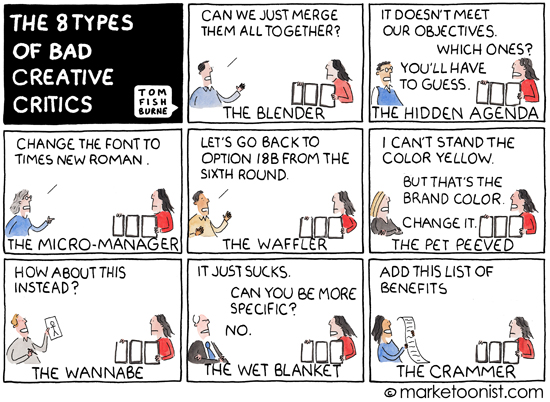I was running a creative training workshop recently where I asked the delegates to evaluate some creative work and whilst we encourage critical thinking, I was surprised with the vigour they proceeded to critique and rip it apart!
I always find the attitude from a group a useful, if informal, bellwether to the way that ideas are treated in their organisation. What I noticed from this group was they tended to dive straight into the negatives and what was ‘wrong’ with the work rather than focussing on what they could learn or take out of it positively to apply to their own work. Of course you need to evaluate your ideas at some point in proceedings but t really made me think about what the purpose of negative or critical thinking is and how it affects the creative process, and people individually. Disney’s model of creativity famously consisted of 3 different elements – the dreamer, the realist and the critic. The story goes that Disney only ever adopted one way of thinking at any one, time working through the stages until the ideas were robust enough to stand up to the critic.
My guess is that the group I was working with all tended to jump straight to critic (or what De Bono calls the black-hatted thinker) without breathing life into their ideas. But if you’re not careful, this kind of thinking can destroy the seeds of an idea without ever letting it see the light of day. Someone who loves to dream can be seen as a time-waster by a realist and devastated by the critic’s approach. Mindset is fundamental to how we generate and evaluate creative ideas.
A researcher called Dr Carol Dweck, a Stanford University Professor has identified what she calls ‘fixed’ and ‘growth’ mindsets as a way to explain how people lean toward two different ways of dealing with setbacks. In the fixed mindset people have a tendency to avoid challenges, give up easily and to ignore useful negative feedback, feeling threatened by others. In the growth mindset people learn from criticism and find lessons and inspiration in the success of others and they persist in the face of setbacks.
What the research shows is that people and companies that have a growth mindset tend to be more confident and resilient in the face of challenges.
“You can be very confident in a fixed mind set but every time you have to struggle, every time other talented people come around, one has to guard against the threatening information” says Dweck.
I definitely recognise this mindset in companies that I have worked for and can say from personal experience it does not aid creativity. Find out more about Dweck’s research here.
- Do you recognise yourself in either of Dweck’s mindsets?
- Where do you think your business would sit?
- Do you think you spend more time in any one of the 3 Disney areas? Are you are dreamer, a realist or a critic?
- Do you unleash your inner Paxman on creative work?
- How do you think this positively or negatively affects your own or your colleagues approach to creativity?
- What questions do you use to judge creativity?
Find out more about how to improve your problem solving skills and improve your critical thinking with our creativity raining courses.

